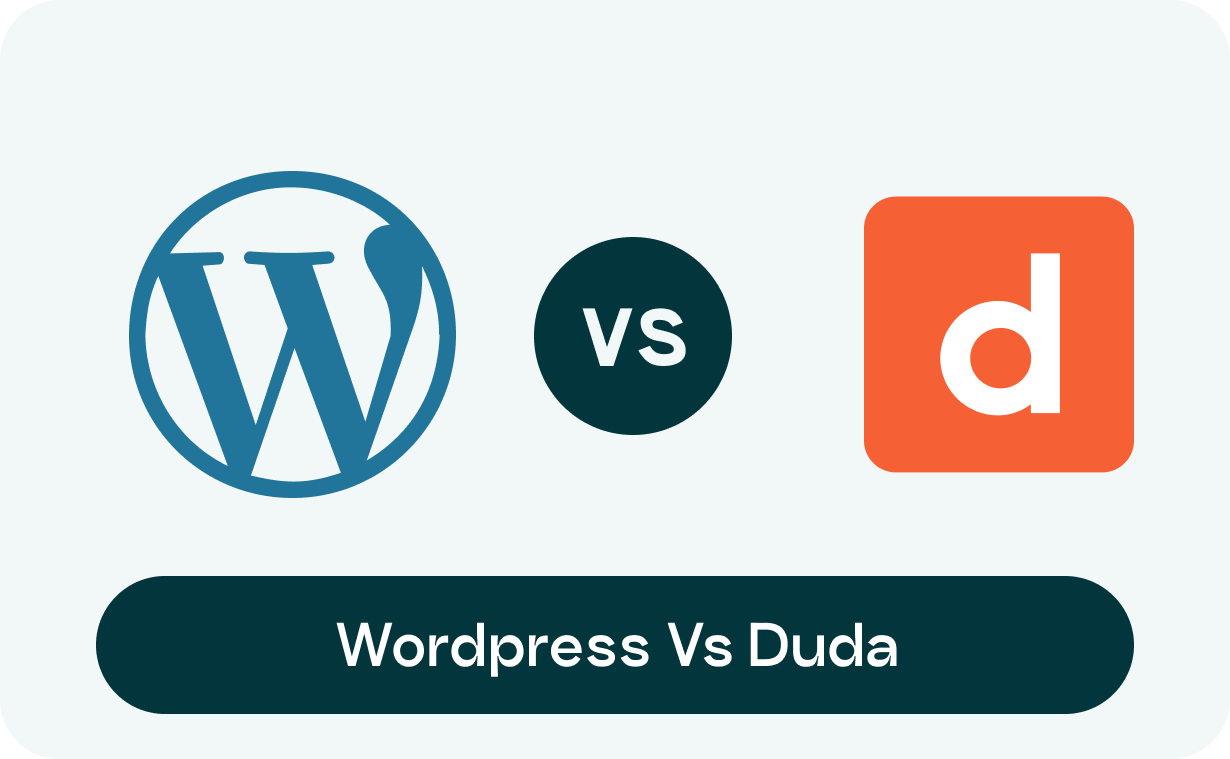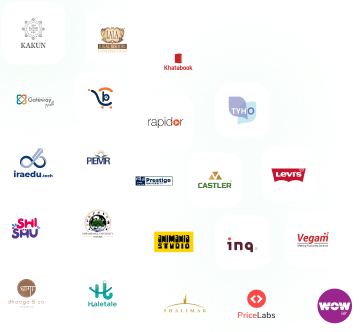WordPress vs Duda: A Comprehensive Comparison in 2025
When it comes to building a website, choosing the right platform is essential to ensuring that your site meets your business goals and is easy to maintain. Two powerful website builders that you might be considering are WordPress and Duda. Both platforms are highly popular but cater to different types of users and needs.
WordPress, the world’s most widely used CMS, is known for its flexibility and vast ecosystem. On the other hand, Duda is a website builder designed with agencies and web professionals in mind, offering a more streamlined experience with a focus on responsive design and scalability.
In this comparison, we’ll look at their key features, ease of use, pricing, SEO capabilities, and support to help you make an informed choice between the two.
Overview of WordPress
WordPress is an open-source content management system (CMS) that powers more than 40% of the internet’s websites. It offers an extensive library of plugins, themes, and a vibrant developer community, making it ideal for building anything from a simple blog to complex eCommerce stores.
Key Features of WordPress:
-
Free and Open-Source: WordPress is free to use, though you'll need to pay for hosting and a domain.
-
Highly Customizable: WordPress offers thousands of themes and plugins for customization.
-
Flexibility: You can build blogs, business websites, portfolios, eCommerce stores, and more.
-
SEO-Friendly: Built-in SEO features and plugins like Yoast SEO and Rank Math.
-
Large Community Support: A vast ecosystem of tutorials, forums, and professional support.
Overview of Duda
Duda is a website builder aimed primarily at digital agencies and businesses. Known for its emphasis on design, usability, and customization, Duda is a cloud-based platform that allows you to create responsive websites quickly. It focuses on streamlining the development process, especially for professionals who need to manage multiple client projects.
Key Features of Duda:
-
All-in-One Platform: Includes hosting, domain management, and an intuitive drag-and-drop website builder.
-
Agency-Focused Tools: Multi-site management, client collaboration, and white-labeling for agencies.
-
Responsive Design: Built-in tools to ensure websites look great on all devices.
-
Custom Widgets: Ability to add custom widgets and HTML for advanced functionality.
-
SEO Tools: Built-in SEO tools with easy integration for Google Analytics, tags, and metadata.
-
Client and Team Collaboration: Allows multiple users to collaborate on the same project.
Feature Comparison Table:
| Feature | WordPress | Duda |
|---|---|---|
| Ease of Use | Moderate (requires some learning) | Very easy (drag-and-drop) |
| Customization | High (plugins, themes, code) | Moderate (templates and widgets) |
| SEO Capabilities | Excellent (plugins like Yoast SEO) | Good (built-in SEO tools) |
| eCommerce | Requires WooCommerce | Built-in eCommerce features |
| Pricing | Free (hosting and domain extra) | Subscription-based (varies by plan) |
| Support | Extensive (community, forums, paid) | 24/7 support, documentation |
| Hosting | Self-hosted or hosted by WordPress.com | Included with the plan |
Ease of Use
WordPress:
WordPress has a steeper learning curve, especially if you are new to website building. It’s a highly customizable platform, but setting it up and maintaining a WordPress site can be overwhelming for beginners, especially if you’re opting for the self-hosted version (WordPress.org). However, the new block editor (Gutenberg) has simplified content creation, and there’s a wealth of tutorials available.
-
Pros:
-
Free core software
-
User-friendly block editor (Gutenberg)
-
Large community and support resources
-
-
Cons:
-
Requires more time to learn
-
Needs hosting, domain registration, and technical setup
-
Duda:
Duda offers a user-friendly, drag-and-drop interface that makes it incredibly easy for beginners and professionals alike to build responsive websites. It’s a great option for agencies that need to design websites for clients quickly. While it is simpler to use than WordPress, it is less flexible when it comes to advanced customizations.
-
Pros:
-
Easy drag-and-drop editor
-
Template-based design
-
Built-in responsiveness across devices
-
No need for third-party hosting
-
-
Cons:
-
Limited customization options compared to WordPress
-
More expensive than WordPress for premium features
-
Winner: Duda (for beginners)
Customization and Flexibility
WordPress:
WordPress is renowned for its customization capabilities. There are thousands of themes and plugins available, giving you the freedom to build any type of website, from blogs to complex eCommerce sites. You can also add custom code if needed. If you have web development skills, you’ll appreciate the flexibility that WordPress provides.
-
Pros:
-
Thousands of themes and plugins
-
Ability to add custom code
-
High level of flexibility
-
-
Cons:
-
Requires technical knowledge for advanced customizations
-
Duda:
Duda offers a more streamlined, template-based design process. While it does allow for some customization, you won’t have the same freedom as WordPress when it comes to deeply modifying the structure or adding unique functionality through plugins. However, Duda does provide customizable widgets and the option to add custom HTML for those who want more control.
-
Pros:
-
Customizable templates
-
Can add custom HTML and widgets
-
User-friendly customization
-
-
Cons:
-
Limited flexibility compared to WordPress
-
Not as suitable for large-scale or highly customized projects
-
Winner: WordPress (for flexibility)
SEO Capabilities
WordPress:
WordPress is known for its powerful SEO features, especially with plugins like Yoast SEO and Rank Math. These plugins help you manage meta tags, sitemaps, and other essential SEO elements easily. WordPress also gives you complete control over URL structures, tags, categories, and on-page SEO optimization.
-
Pros:
-
Excellent SEO plugins (Yoast, Rank Math)
-
Full control over SEO settings
-
Integration with Google Analytics
-
-
Cons:
-
Needs plugins for advanced SEO features
-
Duda:
Duda offers basic SEO tools built into the platform. It includes metadata editing, alt text for images, and integration with Google Analytics. While Duda provides good SEO functionality, it’s not as robust as WordPress when it comes to advanced optimization strategies.
-
Pros:
-
Built-in SEO tools
-
Easy metadata and Google Analytics integration
-
-
Cons:
-
Less control over advanced SEO features
-
Limited third-party SEO plugin support
-
Winner: WordPress (for advanced SEO)
Pricing
WordPress:
WordPress itself is free, but you need to pay for hosting (which can range from $3 to $30+ per month) and a domain name ($10–$20/year). If you want premium themes or plugins, that will add to the cost as well.
-
Pros:
-
Free core software
-
Flexible pricing based on your needs
-
-
Cons:
-
Additional costs for hosting, domains, themes, and plugins
-
Duda:
Duda is a subscription-based platform with three main pricing plans: Basic, Team, and Agency. The plans range from $14 to $74 per month, depending on the features and number of clients you need to manage. All plans include hosting, domain management, and other built-in tools.
-
Pros:
-
All-in-one platform with everything included
-
Predictable monthly pricing
-
-
Cons:
-
More expensive than WordPress, especially for premium plans
-
Winner: WordPress (for affordability and flexibility)
Conclusion: Which Should You Choose?
| Criteria | Best Choice |
|---|---|
| Ease of Use | Duda |
| Customization | WordPress |
| SEO Capabilities | WordPress |
| eCommerce Features | Duda |
| Cost | WordPress |
| Support | Duda |
Final Verdict:
-
Choose WordPress if you need maximum flexibility, advanced customization options, and powerful SEO capabilities. It’s ideal for users with some technical skills or those willing to learn.
-
Choose Duda if you’re a beginner, need an easy-to-use platform for creating responsive websites quickly, and are willing to pay a bit more for convenience.
FAQs: WordPress vs Duda
1. Is WordPress better for beginners than Duda?
While WordPress has a learning curve, Duda is more beginner-friendly with its drag-and-drop editor and all-in-one features.
2. Can I build an eCommerce site with Duda?
Yes, Duda includes eCommerce features built into its platform, but it is less customizable than WordPress with WooCommerce.
3. Does Duda offer free hosting?
Yes, hosting is included with Duda’s subscription plans, while WordPress requires separate hosting and domain services.
4. Can I add custom code in Duda?
Yes, Duda allows you to add custom HTML, CSS, and JavaScript, but it’s less flexible than WordPress in terms of deeper customizations.
5. Which platform is better for large-scale websites?
WordPress is more suitable for large-scale websites that require advanced customization, while Duda is better for smaller to medium-sized websites.











